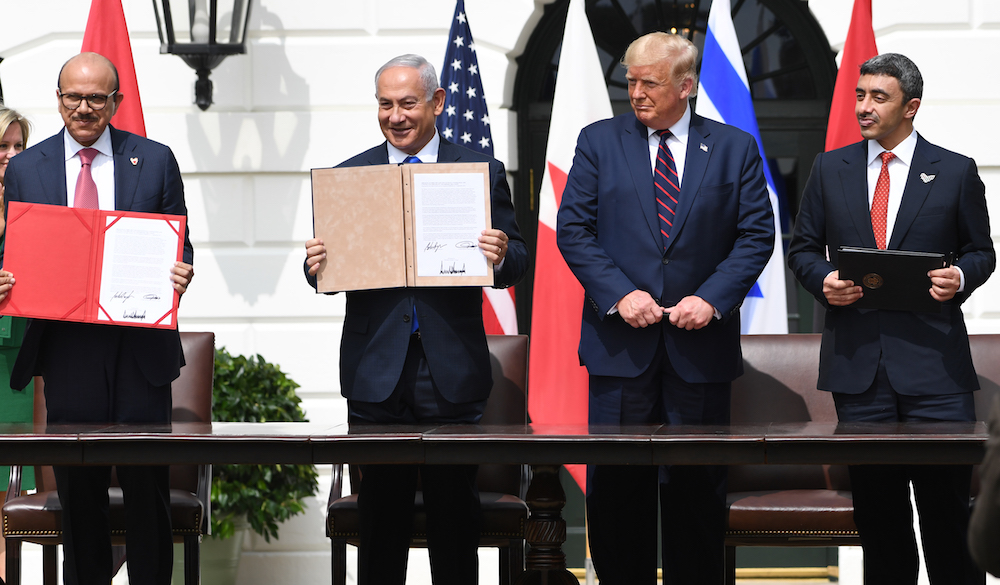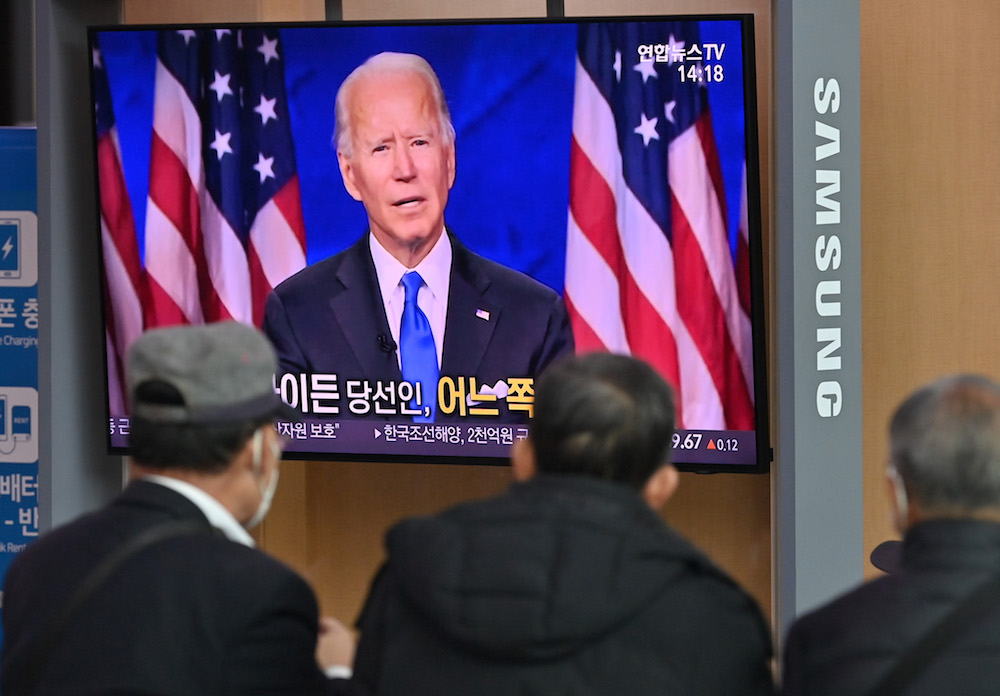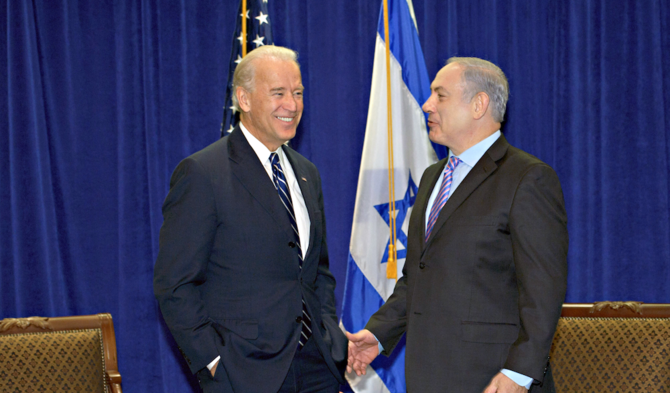DUBAI: Joe Biden was a longtime member of the US Senate Committee on Foreign Relations, but the jury is still out on foreign policy’s exact place in the projected US president’s list of priorities.
Many analysts are of the opinion that while the Middle East may not be the Democratic administration’s overarching concern, the US has no interest in withdrawing from the region.
Experts who participated in a session, entitled “US Elections: The Return of International Competition in the Middle East,” anticipate a shift in relations between the US and the Arab world.
Monday’s virtual panel discussion, moderated by Ebtesam Al-Ketbi, president of Emirates Policy Center, was part of the seventh Abu Dhabi Strategic Debate.
“The Middle East is not a big priority for this incoming administration,” said Paul Salem, president of The Middle East Institute. “The US is going through the worst pandemic in a century and the worst economic contraction since the Great Depression of the 1930s. Middle East foreign policy didn’t figure in the election and the American public is not focused at all on it.”
He said the Biden administration was mainly focused on domestic issues — and foreign policy matters involving the pandemic, climate change, economic recovery or competition with Russia and China.
Recalling that the first foreign visit by President Donald Trump was to a Middle East city (Riyadh), Salem said: “All of this won’t be the case in a new Biden administration.”

(L-R)Bahrain Foreign Minister Abdullatif Al-Zayani, Israeli Prime Minister Benjamin Netanyahu, US President Donald Trump, and UAE Foreign Minister Abdullah bin Zayed Al-Nahyan hold up documents after participating in the signing of the Abraham Accords. (AFP/File Photo)
His sentiments were echoed by Steven Cook, Eni Enrico Mattei Senior Fellow for Middle East and Africa Studies at the Council on Foreign Relations, who said it could take six months or more for the Biden administration to “flesh out” its approach to different conflicts and countries in the Middle East.
He said Biden’s first destination would likely be Canada, followed by Europe. “The big question is whether we will see continuity or real change in US foreign policy in the Middle East,” Cook said. “The tendency is to see a lot more continuity in the relationships and the approach to the region, although there have been significant swings in American foreign policy from administration to administration in recent years.”
With regard to Iran, he expects a shift from “maximum pressure” towards re-engaging with the Islamic Republic and efforts to re-enter or re-negotiate the 2015 Joint Comprehensive Plan of Action, known commonly as the Iran nuclear deal.
“That is a very significant change from President Trump,” Cook said. “It’s something that leaders on the other side of the Gulf are going to have to brace for because this is something, I think is going to be central to a Biden administration’s Middle East policy.”
FASTFACTS
Abu Dhabi Strategic Debate
* Is the 7th ADSD, and is being held on Nov. 9, 10 & 11.
* Main topics are COVID-19, US elections and UAE-Israel treaty.
* Discussions being held via Zoom and live-streamed on social media.
Concurring with Cook’s view, Salem said Biden will probably look to strengthen the nuclear deal and engage in negotiations on missile defense and Iran’s “interference” in regional countries. “What Biden can benefit from is that Trump has left him with a lot of leverage over Iran,” he said.
“There are so many sanctions now that will not be removed as a result simply of the nuclear deal, that a Biden administration could use in diplomacy with Iran to get a better result than they got a few years ago.”
As for Washington’s Gulf allies, he foresees different kinds of relations, lacking the personal warmth that existed under Trump. As such, he said that leaders of the region and Biden’s team would have to figure out the dynamics of those relations. “But there is no doubt that partnership for economic, energy, security and political reasons with the main Gulf countries will remain and is not going to be greatly affected,” Salem said.
Cook described the US-Saudi relationship as important but one that should be institutionalized and subjected to a proper foreign-policy process in the US. In terms of Democrats’ behavior towards the Kingdom, he anticipates a change of tone but did not foresee Biden undertaking tangible policy changes at a moment when the US is dealing with a global pandemic, the worst economic situation since the 1930s, racial problems and a deeply divided populace.
“The president’s inbox on domestic affairs would suggest that taking on so much in the Middle East is not something that’s going to happen,” said Cook.
According to William Wechsler, director of the Rafik Hariri Center and Middle East programs at the Atlantic Council, the Biden victory will benefit the region, as a second Trump term would have accelerated the dynamic of a perceived US withdrawal from the Middle East.
“Biden is, at heart, an internationalist, an institutionalist, and from an older generation of what the longstanding US interests and relationships are in the Gulf and the wider Middle East,” he said. “And that’s how he will approach these issues.”

While William Wechsler belives Biden is an internationalist at heart, experts expect his administration to be focused on domestic issues and foreign policy matters involving the pandemic, climate change, economic recovery or competition with Russia and China
However, because of this widespread perception of American withdrawal, Wechsler foresees many other countries moving into a new vacuum, with China standing as a large economic reality in the region. And although China is not yet part of Middle East geopolitics, he believes the situation will change eventually.
“You have three important non-Arab actors – Russia, Iran and Turkey – moving into that vacuum as much as they possibly can,” Wechsler said. “In the old days, any attempts by those actors to move in would have to deal with traditional Arab powers in Cairo, Damascus and Baghdad. None of those places are in a position to provide the kind of leadership for the Arab world as they once did.
“So, what’s left is a growing coalition of countries that had not previously been large geopolitical actors in the region — and that’s the Gulf countries and Israel — that are in a position to block (the non-Arab actors’) movement.”
Suggesting that a Biden administration would be “wise” to encourage the phenomenon, Wechsler said he anticipated that this development would be continued and pushed.
Overall, the US is not perceived to be withdrawing from the Middle East due to its interests, but rather recalibrating, with hydrocarbons remaining a key energy component in the foreseeable future. “The US won’t give up control of that to Iran or China,” Salem said.
“The focus on weapons of mass destruction is a 21st century problem that the US can’t live with, and the problem of terrorism remains America’s number one national security issue. The US has a major military, economic, diplomatic and political presence in the Middle East, so it’s not going anywhere.”
Wechsler sees a potential US withdrawal from the region an “absolute disaster,” but believes Biden is the best candidate for this issue thanks to his decades-long experience in the field. “It’s a really important opportunity for those in the region, especially in the Gulf,” he said.
“Because if they can establish a modus vivendi with the Biden administration about what the right kind of rebalancing of roles and responsibilities are to protect our common interests in the region, how we can both project our common values, which will be much more important to Biden than to Trump, then they would have really set the stage for a longstanding, new understanding of the American role in the region.”
-------------------
Twitter: @CalineMalek






























